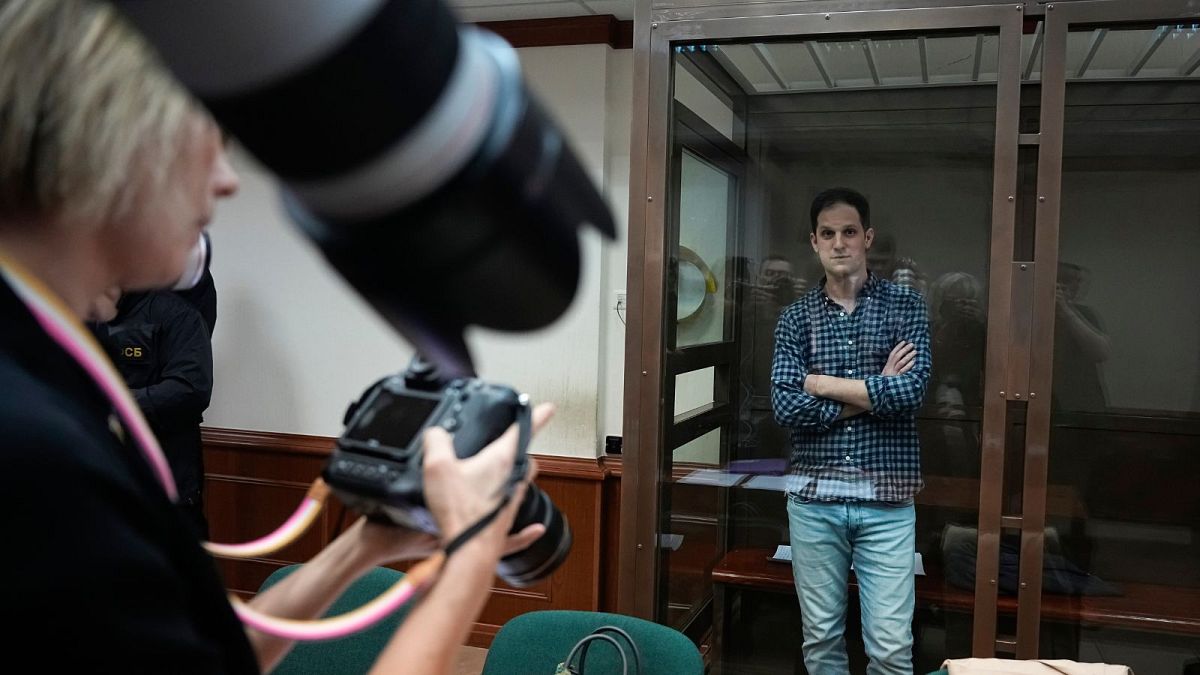
Concern is growing for the safety and freedom of journalists across Europe.
Especially in countries like Belarus and Russia, members of the media have been illegally spied on, hit by abusive lawsuits and detained, though there are also issues in the West.
That’s according to this year’s annual report from the Council of Europe released on Tuesday.
Despite a significant drop in the number of journalists killed in Europe in 2023 compared to the year before, threats faced by the media in the Council of Europe’s 46 member states become more diverse, making them more tricky for reporters to navigate.
The report, titled “Press Freedom in Europe: Time to Turn the Tide”, assessed major issues undermining press freedom in Europe.
These include threats: intimidation, detention, restrictive legislation, abusive lawsuits and attacks on public service media, among others.
It found that of the total 285 alerts on serious threats and attacks on the freedom of the media in the continent, nearly 15% came from Russia alone. The country keeps persecuting journalists who criticised the Kremlin line, including those who have fled overseas.
According to the report’s authors, the threat of mafia-type violence currently “hangs like dark clouds above journalists on the crime beat,” especially those researching the drug trade.
Threats in Europe: the numbers
The kind of threats faced by journalists across Europe range from physical attacks, death, detention, illegal surveillance, media bashing by politicians and effective muzzles imposed by the government.
A big threat to journalists’ physical safety in 2023 was Russia’s full-scale invasion of Ukraine. Last year, two journalists – Bohdan Bitik and Arman Soldin – were killed while reporting on the war in Ukraine, while several others were injured. Both died during Russian strikes.
Another member of the media, security guard Pal Kola, was killed in 2023 in an attack on the Top Channel TV station in Albania. Kola’s was the only case of a media worker killed outside of a war zone.
There were a total of 41 alerts denouncing attacks on the physical safety and integrity of journalists in 2023: 11 came from Russian-occupied territories in Ukraine; four from France; four from Turkey; three from Italy; and three from Serbia.
Detention remains a common punishment for journalists critical of their country’s leaders, especially in Russia and Belarus.
As of the end of 2023, 59 journalists were jailed in countries across Europe, including in Russian-occupied Ukrainian territories. 65 were detained in Russia and Belarus.
At least 18 journalists were detained last year in Turkey, while Poland and the UK detained one each (respectively Pablo Gonzales and Julian Assange).
These were the countries that reported alerts of threats on journalists in 2023: Belarus (42); Russian Federation (39); Turkey (27); Ukraine (24); France (19); Italy (16); Poland (12); Serbia (11); Azerbaijan (10); Greece (9); Albania (6); Spain (6); United Kingdom (5); Slovak Republic (5); Georgia (5); Bosnia and Herzegovina (5); Bulgaria (5); Armenia (4); Croatia (4); Germany (4); Netherlands (4); Republic of Moldova (4); Belgium (3); Czechia (3); Finland (3); Austria (2); Hungary (2); Denmark (1); Ireland (1); Latvia (1); Malta (1); Portugal (1); Romania (1).
There were already 27 alerts on threats to journalists in Europe since the beginning of the year, most of which in Ukraine (7), Turkey (6), the Russian Federation (4) and Portugal (3).
Impunity for killing journalists
The Council of Europe’s report also highlights that by the end of 2023, there were still 30 cases of impunity for the murders of 49 journalists and media workers.
The cases remain open to this day despite the assassinations having occurred long before.
According to the Council of Europe’s report, impunity for the murders of journalists – where investigators and prosecutors failed to find the culprits and secure a conviction – is still the norm.
In November 2023, a former Russian police officer serving a 20-year prison sentence for his role in the 2006 murder of journalist Anna Politkovskaya, a critic of Vladimir Putin, was pardoned by presidential decree after completing a six-month military contract fighting in Ukraine.





